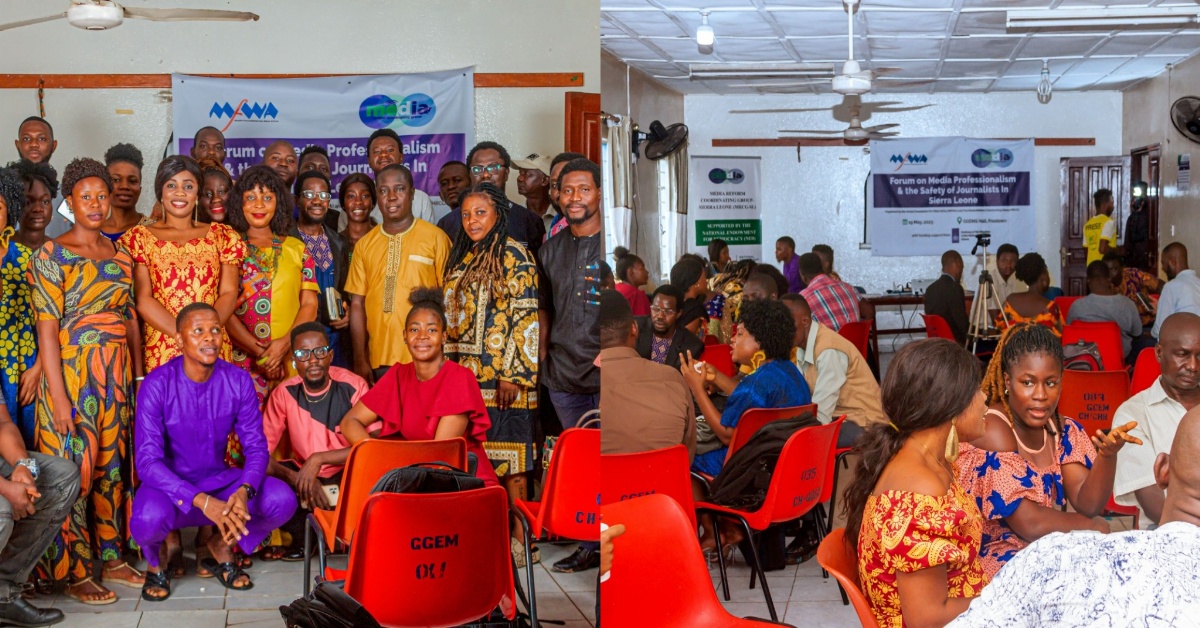The Media Reform Coordinating Group (MRCG) Sierra Leone, in partnership with the Media Foundation for West Africa and with the support of the Embassy of the Kingdom of the Netherlands in Ghana, recently organized an event focused on media professionalism and journalist safety in Sierra Leone.
The event took place on May 19, 2023, at the GGEMS Hall on John Street in Freetown.
During the event, Dr. Francis Sowa, the National Coordinator of MRCG, presented the findings of a research study conducted in 2020 by the Media Foundation for West Africa and MRCG. The study examined the policies and practices regarding journalist safety in forty-four media outlets across Sierra Leone, including radio stations, television stations, newspapers, and online media.
Dr. Sowa highlighted key issues such as the trends in safety violations faced by journalists in Sierra Leone, the perpetrators of these violations, the presence of safety policies and manuals in media outlets, and the specific policies for female journalists.
Dr. Sowa emphasized that Sierra Leone is among the countries where concerns about the safety and security of journalists have been raised. He mentioned that from 2018 to May 2020, MRCG, with support from the National Endowment for Democracy in the United States of America, has been monitoring and publishing reports on press freedom and freedom of expression issues in Sierra Leone.
These reports documented cases of intimidation, attacks, arrests, and prosecutions of journalists and activists advocating for free expression. According to the last report released in May 2020, out of the 26 cases monitored, 21 involved journalists who faced intimidation, attacks, arrests, or legal charges.
Regarding the types of safety and security issues faced by journalists in Sierra Leone, Dr. Sowa noted that almost all respondents reported experiencing at least one of the following violations: intimidation, harassment, humiliation, arrest, detention, and physical attacks.
The perpetrators of these violations were identified as the Sierra Leone Police and politicians, with other categories including chiefs, community stakeholders, military personnel, civil servants, and members of the public.
Dr. Hindolo J. J. Tonya Musa, a media expert, and lecturer at the Department of Media Studies, FBC, presented on the safety and security of journalists reporting on the 2023 elections in Sierra Leone.
He highlighted the increased risks journalists face during elections when covering rallies, campaign events, and protests.
He stressed the importance of organizing training sessions for various media professionals to enhance their understanding of reporting techniques and strategies to mitigate physical, psychological, and digital risks.
The aim is to promote conflict-sensitive and professional reporting during the upcoming elections.
Dr. Musa acknowledged the crucial role of the media in ensuring free and fair elections but emphasized that election coverage can be demanding, stressful, and dangerous for journalists.
He mentioned proposals from UNESCO and other media development agencies, such as strengthening self-regulatory mechanisms, providing training on ethical reporting and conflict sensitivity, and encouraging media professionals to commit to a code of conduct.
Several individuals also expressed their views during the event. Eastina Taylor, President of WIMSAL, emphasized the importance of maintaining professionalism in journalism. Khalil Kallon, Executive Secretary of IMC, highlighted the paramount need for journalist safety and protection, emphasizing the role of professionalism and balanced reporting. Christian Conteh, a representative from SLAJ, commended MRCG for upholding professionalism and ethical journalism and pledged SLAJ’s continued support.
The event concluded with journalists in attendance actively participating and offering their recommendations.


 1 Comment
1 Comment









Please do not waste your valuable time and resources to train the Journalists of this county. They all have their political parties and vested intererests in people they openly support.
The people of Sierra Leone know that the journalists are BIAS and Particians including the BBC reporter